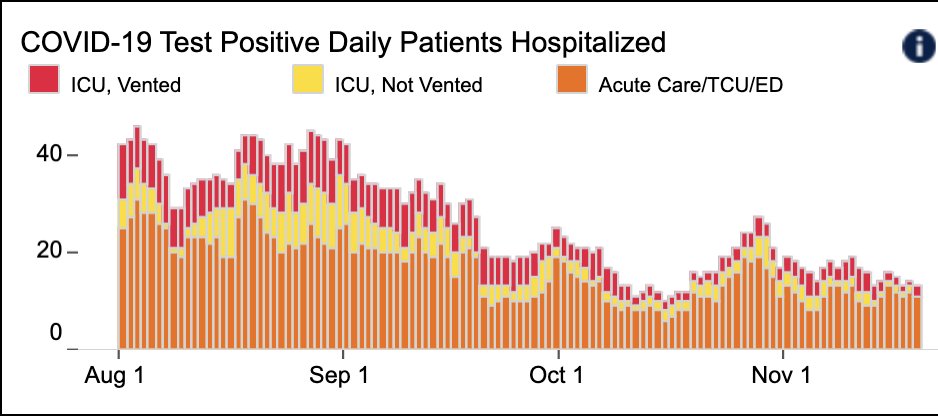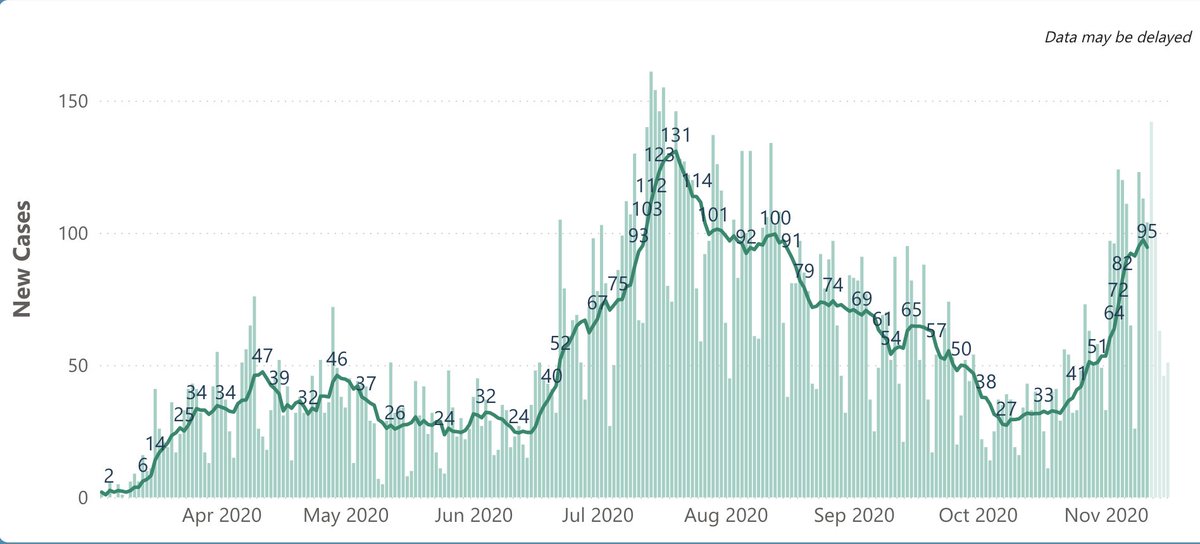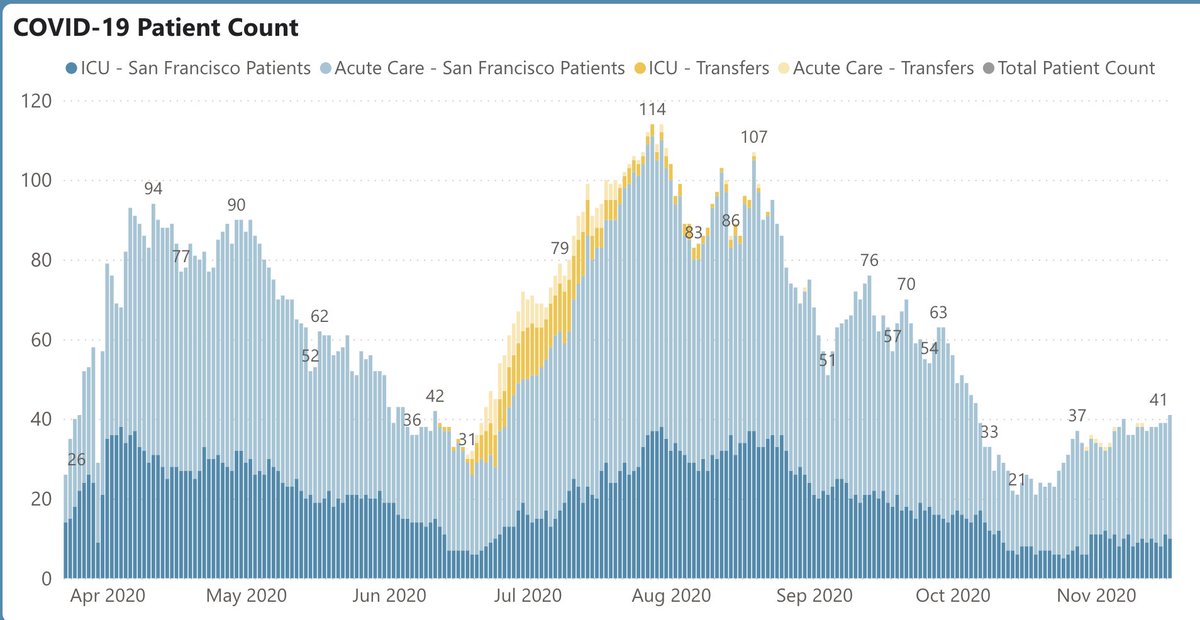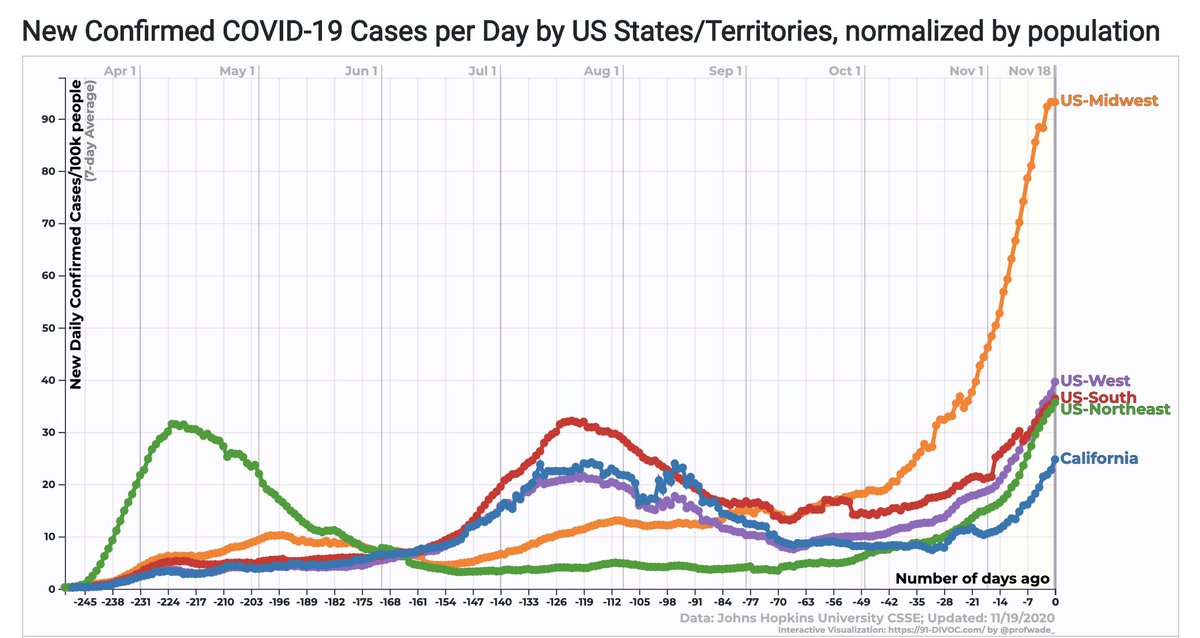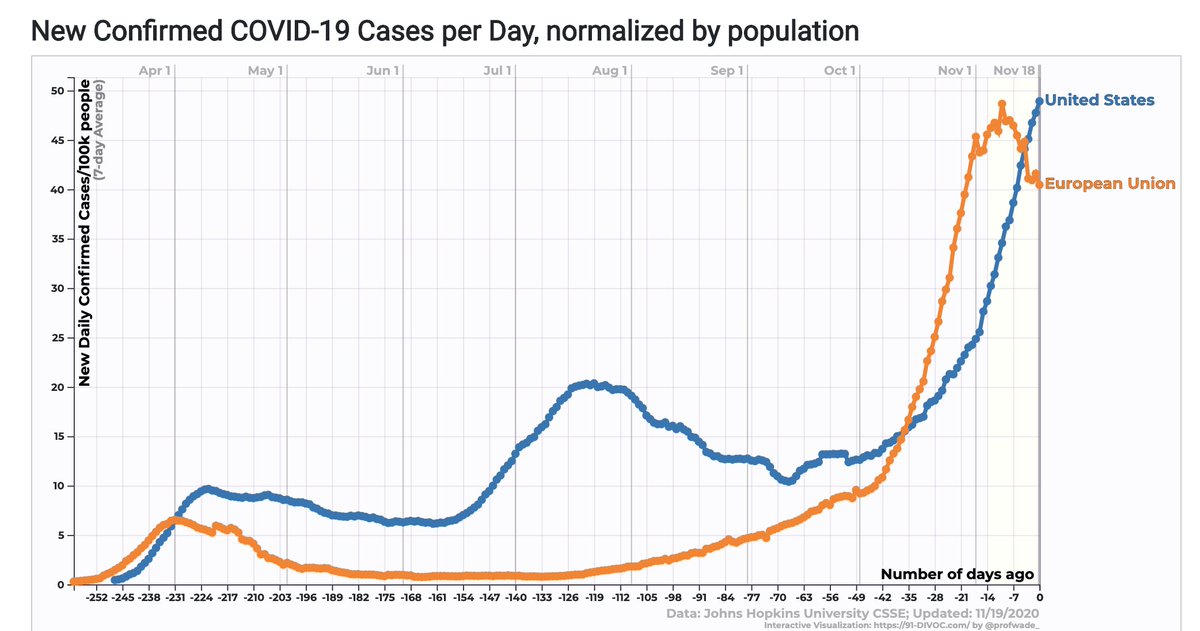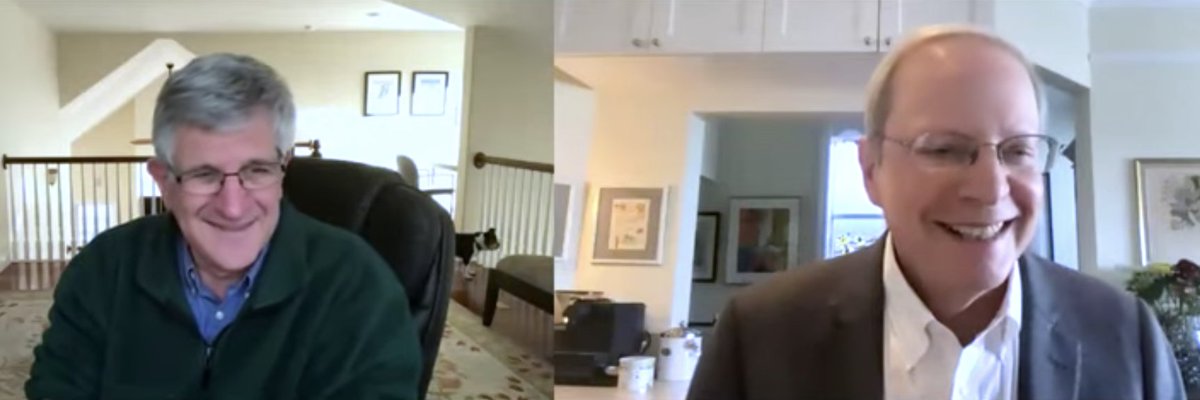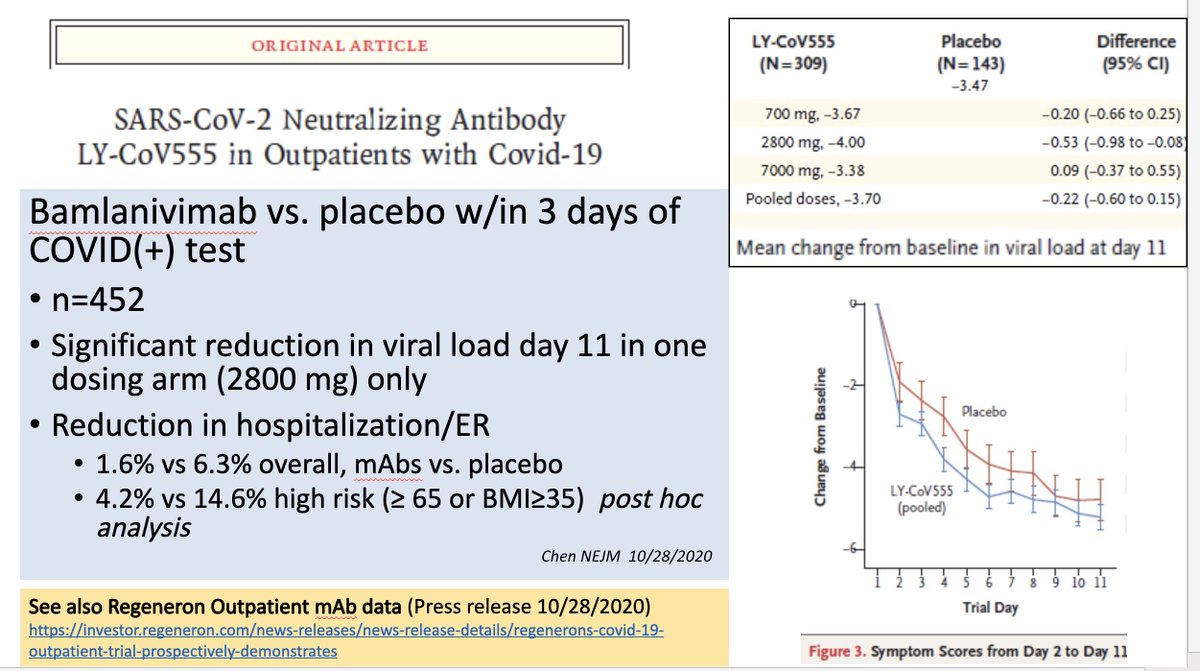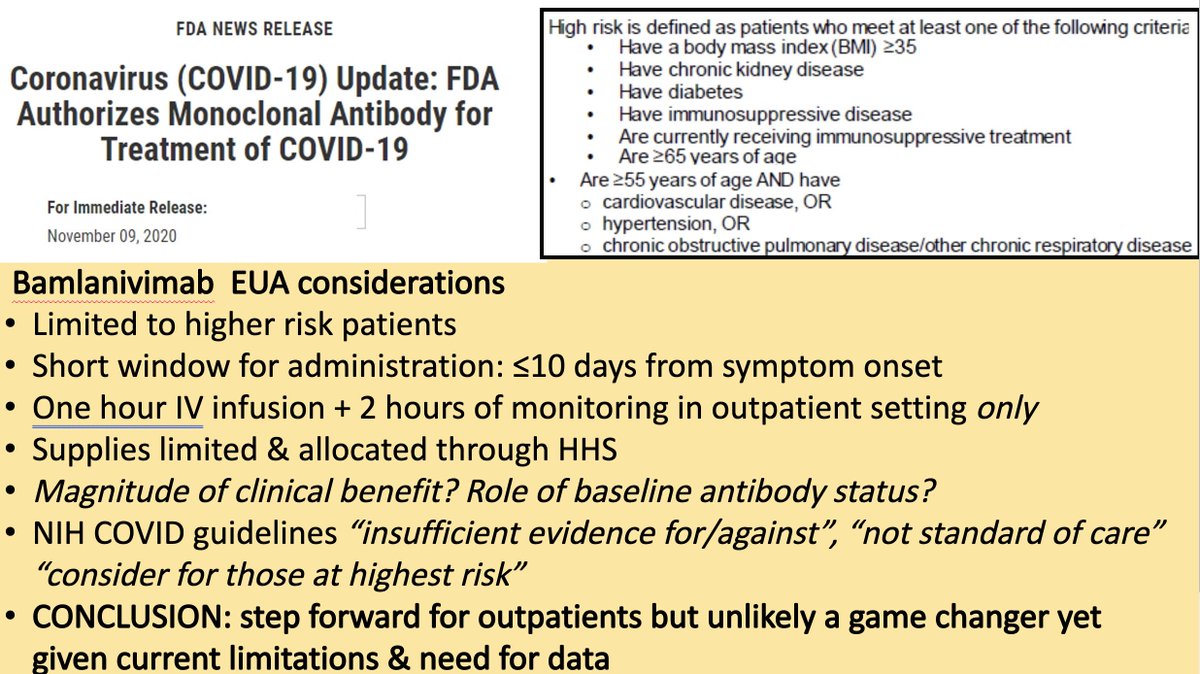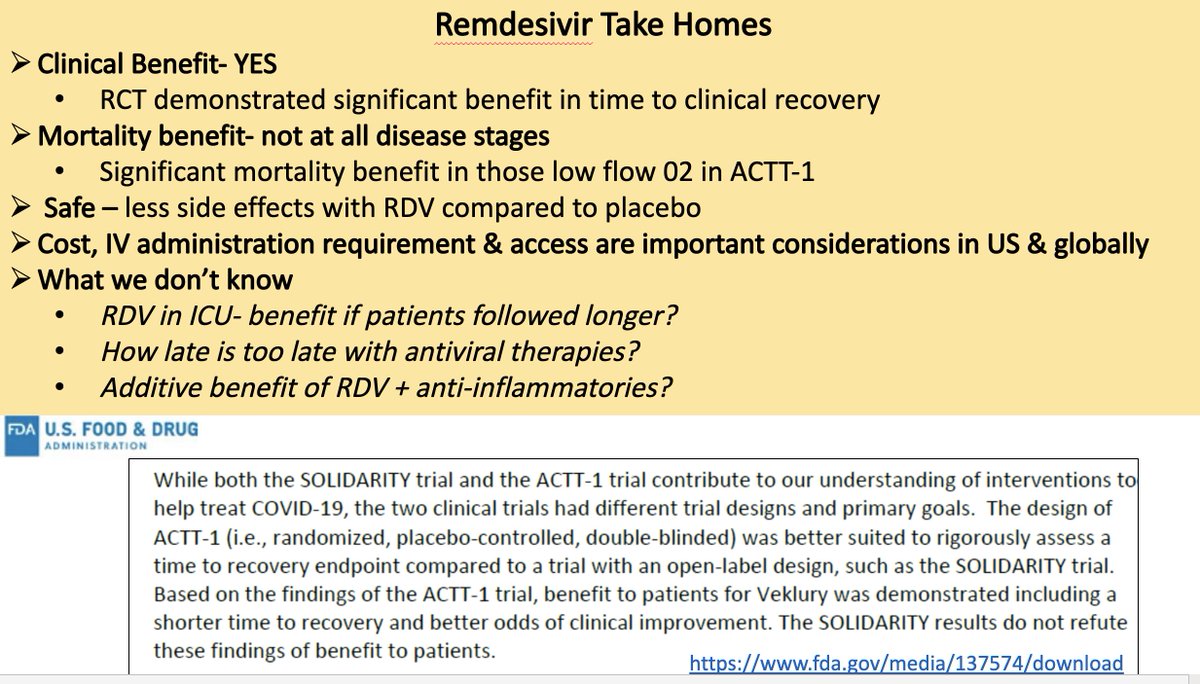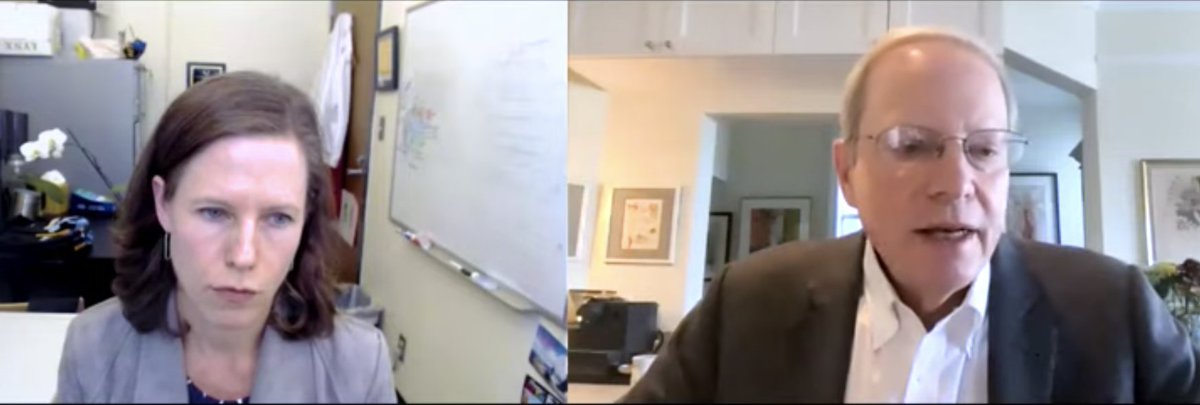1/ Covid ( @UCSF) Chronicles, Day 247
Fabulous @UCSF Covid Grand Rounds today: @DrPaulOffit @Penn on vaccines, @annieluet on treatments: https://tinyurl.com/y6swyu9e ">https://tinyurl.com/y6swyu9e&...
I’ll start with a few SF & national updates, then summarize a few key points, mostly focused on the vaccine segment.
Fabulous @UCSF Covid Grand Rounds today: @DrPaulOffit @Penn on vaccines, @annieluet on treatments: https://tinyurl.com/y6swyu9e ">https://tinyurl.com/y6swyu9e&...
I’ll start with a few SF & national updates, then summarize a few key points, mostly focused on the vaccine segment.
2/ Local update: interesting disconnect between cases vs. hospitalizations/deaths here in SF & @UCSFHospitals. While cases up in SF, @UCSF, we’re still pretty stable (Fig L): 15 pts, only 1 on vent. Test + rate mildly up: 4.85% in pts w/ symptoms; 0.78% in those without (Fig R).
3/ SF cases are still spiking, though maybe (wishful thinking?) a tiny plateau (Fig L), now 95/day. Hospitalizations pretty stable @ 41, 2x of two wks ago but not skyrocketing (Fig R). Deaths stable: 156 since start of Covid. Test positivity 1.97%: also up but still fairly good.
4/ Moving to Bay Area & CA – the uptick in cases is sharper; both ~2.5x over last month& #39;s nadir. As always, don’t be lulled by flat death #‘s – sadly, they’ll come, as night follows day. CA tightened its rules today, issuing a stay-at-home order after 10pm https://tinyurl.com/y2q8y4ye ">https://tinyurl.com/y2q8y4ye&...
5/ The national numbers are still awful. Figure shows CA (per 100K cases) plotted against 4 regions in U.S. It puts CA’s uptick into perspective – particularly compared with the Midwest, still suffering from an enormous surge. Clinicians there are exhausted, hospitals are filled.
6/ More than 900 (!) clinical staff at the Mayo Clinic are now out with Covid https://tinyurl.com/y2bv6ubt ">https://tinyurl.com/y2bv6ubt&... – mostly transmitted in the community. Hard to see how you keep your hospitals/clinics staffed with that kind of workplace sickness rate.
7/ That’s biggest worry: when cases hit a certain threshold, all systems break: testing, contact tracing, hospitals, ICUs. Then it’s tragedy on top of tragedy – many more deaths & cases than “necessary” since the region is flying blind & can’t offer optimal care to the very sick.
8/ We’ve started to tighten up, but often with baby steps, nowhere near the strong medicine that’s needed – particularly in the Midwest, where states are starting to act, but it’s still pretty weak tea https://tinyurl.com/y32gt48q ">https://tinyurl.com/y32gt48q&... Europe has acted more decisively, and it shows, below.
9/ As I said yesterday, it’s a split screen: all this uniformly terrible news about the current state, juxtaposed w/ amazing news on vaccines, which we discussed in grand rounds. Below are a few key points made by @DrPaulOffit, though you really should watch the whole session.
10/ “If you’d have asked 100 top U.S. scientists in January where we’d be now [with vaccines], no one would have guessed it.” Worth recognizing how remarkable the @pfizer & @moderna_tx results really are. Particularly since mRNA was a completely novel strategy, never before used.
11/ Next step: Pfizer has requested an EUA from @US_FDA. FDA created huge skepticism re: approval process by politicizing the EUAs for hydroxychloroquine & convalescent plasma. “So people are skittish.” The difference is that these vaccines WERE rigorously tested in huge trials.
12/ Luckily, FDA is back on the rails "because Hahn finally stood up for the agency.... The breaking point was when Hahn announced that the FDA would require 2 months of data.” That was the key moment. Paul sees no more need for additional state-based approval (planned in CA).
13/ Why an EUA and not a full FDA approval? “No vaccine would be approved by the FDA that had been tested for [only a couple of months].” Then why would an EUA be OK? Because the 95% efficacy signal is so strong that we can be confident that vaccines work very well....
14/ ...and, in terms of safety, Paul can& #39;t recall examples of vaccines that had severe side effects that emerged after 6 wks. What& #39;s next? “If you had to predict the way this will play out… we could see these vaccines [being available to the public] by the 3rd week of December.”
15/ Will vaccine immunity be long-lasting? “Have to wait & watch, but there are hopeful signs.” He& #39;s confident that immune response will be durable – while it may diminish over time, it will snap back in fewer days than it takes to get sick from the virus, so the vaccine wins.
16/ Virus not yet mutating, also promising – we may not need a reformulated vaccine like we do for flu each year. Vaccines often generate a better immune response than the disease itself. Covid vaccines clearly prevents illness; we don’t know yet if they prevent viral shedding.
17/ Should people get antibody tested before being vaccinated? Answer: unequivocal no. 1) It’s complex logistically to test before vaccination; and 2) we would still vaccinate people with positive antibodies (tests are imperfect, and vaccine will boost their immunity).
18/ Vaccine distribution is very complicated. Paul discussed how state of PA is preparing. States should be able to pull this off, if they have clear info on shipments, & some federal $ s to create vaccine centers. He expects more national guidance from the Biden administration.
19/ Fairly confident we& #39;ll have more vaccines. “History of vaccine development is that 1st ones aren’t the best.” “I would be cautious about saying these vaccines are 95% effective" – he wants to wait to see longer term results, to rule out efficacy erosion and "volunteer bias".
20/ Paul is sure that the pharma companies are giving us the straight scoop. If they& #39;re hyping it, “it will be found out.” Like me, he feels that Trump administration got Operation Warp Speed right. A key issue was taking the risk out of development for the pharma companies.
21/ Will people take the vaccine? “It& #39;s reasonable to be skeptical.” But surveys showing 50% not being willing to take a vaccine aren& #39;t really relevant. “They are talking about a theoretical vaccine.” Now that we have real data, “I think vaccines will be the hero of this story.”
22/ Overall, I heard nothing to make me less enthusiastic about November& #39;s vaccine news, though we will need to be open to new information that will emerge from actual use. No doubt that they will be the true game changers, and that the world is pretty fortunate that they work.
23/ Few comments on @annieleut’s talk on monoclonals: no evidence of benefit in hospitalized pts; good evidence for lowered viral load & hospitalization rate (Fig L). EUA seems justified. Logistics of giving monoclonals quickly, in right setting to right pts, is tricky (Fig R).
24/ Annie also covered remdesivir controversy, reconciling seemingly conflicting study results. Still feels that benefits seen in ACTT-1 study for patients on low-flow oxygen justify its continued use, notwithstanding the negative results of SOLIDARITY study. Summarized on Fig L.
25/ Superb grand rounds – I particularly enjoyed vaccine discussion; it answered ~50 questions that I had. I hope you find it useful, again here: https://tinyurl.com/y6swyu9e ">https://tinyurl.com/y6swyu9e&...
Next grand rounds in 2 weeks. Stay safe till then (though I’ll still be @Twitter – I& #39;m not going anywhere!)
Next grand rounds in 2 weeks. Stay safe till then (though I’ll still be @Twitter – I& #39;m not going anywhere!)

 Read on Twitter
Read on Twitter